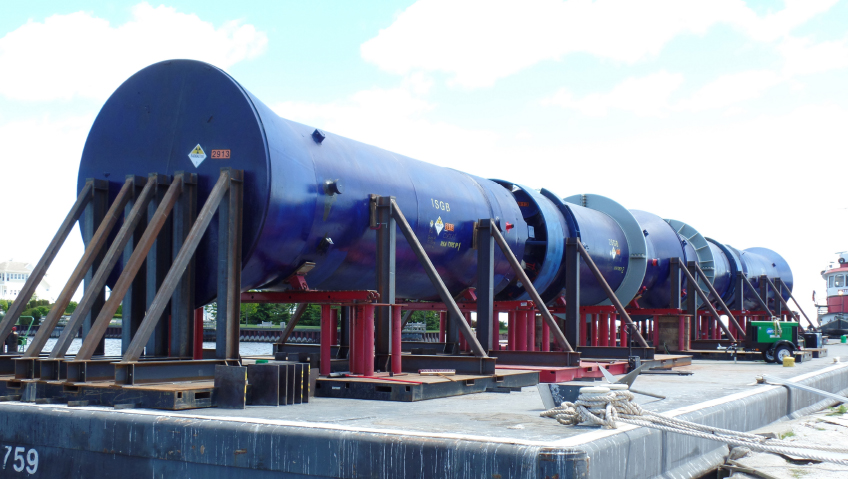Hazardous materials, nuclear waste, hazardous waste, alternative fuels: where do these chemicals go when it’s time to remove them from a worksite? It’s potentially dangerous work, but I.C.E. Service Group, Inc., (ICE) has the experience and expertise to handle the toughest jobs safely and efficiently.
ICE is a privately held corporation, established in 2007 to offer the industrial, construction, and environmental industries top-notch logistical, material management and transportation services, ICE employs an impressive workforce composed of chemists, logistical experts, health and safety officers, Contractor Quality Control System Managers (CQCSM), educators, engineers, and field technicians to ensure safety and protocol compliance.
With offices in New Jersey, South Carolina, South Florida and Tennessee, as well as field / project locations across the United States, ICE serves its customers anywhere in North America, including Canada, Mexico, and the Caribbean.
The founders and key employees of the company have decades of combined experience in a range of transportation methods, logistical support, packing, material management and handling, transloading / transferring, and sales and leasing of transportation equipment.
“We’ve worked together in the industry going on 30 plus years now,” says Morgan, now Senior Program Manager—Special Projects. “We followed each other through the industry and worked for different companies together. Prior to the formation of ICE, we worked with another startup logistics company in the late 90s and early 2000s that we helped grow substantially.
Like a lot of small business owners, the founders basically mortgaged their houses and used their savings. He says, “ICE wasn’t financially backed by anybody. Today, the company is still self-funded.”
Using the knowledge and experience gained from years spent working with other companies, they took those lessons learned and put them into what they’re now doing at ICE.
“One of the ways we’ve grown is by talking to clients and customers and really finding out what their needs are,” says Morgan. “When people ask us, ‘what are your keys to success?’ the one thing is, we don’t say no. When a client calls and says, ‘can you transport this?’ even though we may have never moved what they’re asking us to move, we never say no. We say we will take a look at it, we put our heads together and try to figure out if we want to get into this market, and what are the risks and rewards.”
Now experts in a variety of transportation and material management markets, which include -low-level radioactive waste, RCRA and TSCA waste, non-hazardous waste, biodiesel / ethanol, steel and metal, paper / pulp / wood, and sand, to name a few, ICE’s crew also boasts years of practical expertise in decontamination, demolition, remediation, logistics, industrial services, and education.
ICE supports private, commercial, and government customers, including the U.S. Army Corps of Engineers (USACE), the U.S. Environmental Protection Agency (USEPA), and the U.S. Department of Energy (DOE). These sites include Superfund cleanup sites, FUSRAP sites, decommissioning, dismantlement, and demolition sites, as well as other associated environmental remediation and construction sites.
“It became easier to get involved in other commodities that we typically wouldn’t have because we were focused on hazardous waste and radioactive waste,” says Morgan. “That helped us grow. We’ve moved everything from sand from Ohio to Dubai, believe it or not, to steel from Texas to Ohio.”
The company’s main business, however, is the hazardous material market, the commercial nuclear power industry segment in particular. This specialty requires supporting active power plants that are in re-up modes, changing out their equipment, disposing of their day-to-day material, and managing the packaging and transportation of the components and waste generated during the decommissioning of commercial nuclear power plants.
“We’re working at several nuclear power plants throughout the country where we’re working for contractors that are decommissioning them, and we’re managing all the packaging and transportation logistics for them,” Morgan says. “We’re also working at a lot of the Department of Energy (DOE) labs throughout the country that are involved with past legacy work, to work on former sites involved with the Manhattan Project that are being managed by USACE.”
Being constantly innovative, he stresses, is a big part of the company’s longevity. “We’re always looking at doing things more efficiently, more strategically. Can we improve on something, do we develop a new container, do we develop a new soft-sided bag?” says Morgan. “Sometimes a client will give us a scope of work to fill out based on how they want to do the project, and we’ll look at it and say, ‘we’ll quote it the way you want it quoted, but we’ll give you some alternatives too that you maybe haven’t thought about.’”
Showing clients how to save money, either through transportation alone or by reducing the schedule by doing something a little different, is a top priority for ICE.
“A lot of our keys to success have been convincing clients to get us involved early on in the design phase of the project, the planning stages, so we can help them improve their efficiencies by getting a project done quicker,” says Morgan. “Not having a longer period of time where you’re having a bunch of equipment on a project means you shave one to two months or more off of project, and the savings is significant.”
Transportation plays a vital role in ICE’s success, with a host of options at the team’s disposal. The company offers rail services all over North America, where a variety of materials can be delivered effectively and safely thanks to the company’s intermodal containers and fleet of privately marked railcars. “Our transportation assets number well into the hundreds, including cargo containers, intermodal containers, gondola railcars, rail tank cars and rail flatcars.”
There’s also heavy-haul / over-dimensional machinery and equipment with truck-to-rail or rail-to-truck transloading or transferring if an origin or receiving site is not directly supplied by rail. ICE has access to a vast network of trucking assets across North America and offers flatbed (45′, 48′, and 53′), drop deck, low-boy, van, tanker, and dump vehicles as well as trailers and trucks.
Marine (river and ocean) transportation services across North America include international marine shipments coming to and from the U.S. Virgin Islands and the Caribbean Islands with continuously provide cargo container/intermodal shipments for a wide range of materials including plastic, hazardous waste, non-hazardous waste, biodiesel, rope, steel and other materials.
While the most cost-effective mode of transportation is often by rail or ship, if a railroad can’t reach the origin or destination site, ICE can transload and/or transfer material between various modes of transportation, whether it’s temporary or more extensive/long-term.
On the packaging side, the company uses a variety of options including intermodal containers, cargo containers, and soft-sided packages. In 2017, the ownership team of ICE purchased the assets of a soft-sided packaging company, Strategic Packaging Systems, LLC in Madisonville, Tennessee. The new company, ICE Packaging Company, LLC d/b/a Strategic Packaging Systems (SPS), operates out of 75,000 square feet of office, manufacturing and warehousing space. The primary goal of SPS is providing the environmental, construction, and industrial sectors with alternative packaging through custom design, manufacturing, warehousing, and distribution.
That attention to customer service, coupled with acquiring the right team for the job, is one of the main reasons ICE continues to succeed year after year.
“No matter what you have, no matter what the product or service is, if you don’t have the right team of people behind you, you’re not going to succeed,” Morgan says. “You could have the best product in the world, but if you can’t get that product out to the right people, you’re going to have a very expensive paperweight basically.”
Everyone involved in ICE plays a key role in its successes, he adds, with a company turnover rate that’s all but non-existent.
While team spirit and the commitment to the company and each other are vital, this approach also brings its own challenges, says Morgan. “Getting the right people is difficult. We have a certain way we do things, and finding the right people is always a challenge.”
This means recruiting individuals who have the same work ethic and beliefs on how to get things done. “We don’t believe in cutting corners,” Morgan says. “We’re doing things right the first time. We’ve never failed on a project. Our customers are repeat customers, and nine out of 10 times if we lose a project, they come back to us realizing they might have paid less to go somewhere else, but they didn’t get their final project like they should have.”
ICE doesn’t sell on price alone, he adds. If clients are looking at just the number, there’s a lot more involved with that number than what’s on paper, especially if they want the job done properly.
While milestones are numerous, one that Morgan is particularly proud of is the company’s safety record, with no lost-time injuries, and no work-related injuries ever. “We’re in a pretty dangerous industry,” he says. “We’ve moved well in excess of 15 million tons of material safely. That’s significant.”
That success isn’t the only thing that sets ICE apart from competitors, however.
“I don’t like to use the word competition, because I don’t think we have a competitor,” says Morgan. “We have companies that do similar things that we do in certain parts, but I really feel that when you look at the whole scope of services, there’s really no one out there that does what we do.”
Whether undertaking shipments by truck, rail or marine, transloading, or managing the way clients ask to handle disposal contracts with facilities, ICE does it all, with boots on the ground.
“We’re multifaceted,” Morgan says. “Clients ask for shippers to be on site for six months to manage all the paperwork; okay. And that’s grown over time. For the majority of our larger projects, someone’s on site full-time or part-time. We also have a good mix of projects, from campaign work where it only lasts a day, to projects that last six months, to long-term projects that go on for five or seven years. And it all goes back to not saying no.”













